Dwight and Judy Batts of Wilson County, N.C., own and operate a tree farm on land that has been in their family for more than 100 years. Their harvesting and conservation practices will ensure the sustainability of the tree farm for generations to come. Those practices helped earn them the 2014 National Outstanding Tree Farmers of the Year award from the American Tree Farm System. In 2012, they were named the North Carolina Outstanding Tree Farmer of the Year.
“One of the biggest misconceptions is that cutting a tree is a bad thing. We are put here to be stewards of the land,” says Dwight Batts. “Our farm is a century farm. That is a smaller and smaller club these days because so much land has been sold off for development. Our intention is to keep the land in the family and the way we do that is to make it a productive farm, one where the family can enjoy being here for the beauty, recreation, fishing and hunting. Timber production is our #1 priority because the farm has to pay for itself.”
Meet Tree Farmers Dwight and Judy Batts
Occupation: Dwight and Judy Batts own a tree farm in Wilson County, N.C. They were named the 2014 National Outstanding Tree Farmers of the Year from the American Tree Farm System.
Property: 375 acres (260 acres of loblolly pines, 60 acres of longleaf pines, 12 acres of hardwoods, 15 acres of mixed stands (pines and hardwoods), 12 acres of cleared land and a 12 acre pond.
Equipment: 1957 Farmall 140, 1956 Cockshutt Blackhawk 35, John Deere 2630 and a John Deere 2155; Woods and Frontier rotary mowers; Kawasaki and Stihl brush cutters; Yamaha Kodiak 4-wheelers with spraying and spreader attachments; and Stihl, Husqvarna and Echo chain saws.
Priorities: Cost, performance and durability
Video: Dwight and Judy Batts share their philosophies on tree farming and being recognized as 2014 National Outstanding Tree Farmers of the Year, http://vimeo.com/101441456.
Batts describes his approach to a sustainable farm as “Wood, water, wildlife and recreation. And, now we’ve added in education.” They maintain wildlife plots, raise and release quail and maintain nest boxes for bluebirds and mallard, pintail and wood ducks. Since 2001, the family has hosted more than 1,500 visitors, including tree farmers, school groups, forestry students and delegates from Mexico and China.
Converting to Tree Farm
The original family farm was 160 acres and produced tobacco, corn, soybeans and wheat. “The transition of most of the crop field acreage to forest began in 1984 after my dad and I had a discussion about the direction crop farming was going, which was basically going to be bigger and fewer producers, low crop rent and tobacco phasing out as we knew it,” Batts says. They planted a few acres of trees and then worked with the North Carolina Forest Service and USDA’s Conservation Reserve Program to convert additional acres. Later, Batts purchased another 215 acres and hired contractors to plant most of those acres. All the trees were hand planted, using one of two methods: Using a tree planting tool called a dibble bar to dig each hole or using a tractor and ripper attachment to create rows.
The farm now includes about 260 acres of loblolly pines, 60 acres of longleaf pines, 12 acres of hardwoods, 15 acres of mixed stands (pines and hardwoods), 12 acres of cleared land and a 12 acre pond. Batts says the farm is not large enough to justify owning logging equipment. “We don’t do the harvesting. That’s done by professional logging crews. The primary reason is the cost of equipment and it’s not justified by 375 acres.”
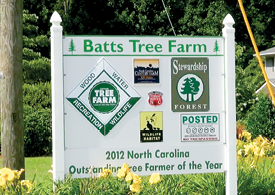
They also work with a consulting forester. “The consultant cruises the forest to figure out what kind of inventory you have on the farm. They break it down by type; pulp, lumber, chips, hardwoods and softwoods. They put out a bid request and buyers come in and submit a sealed bid.”
The value of the trees is constantly changing, based on demand, weather and other factors. “The price depends on many things. For instance, if it’s rainy and you have a high, dry site, then you are going to get top dollar. Where you’re located relative to the mills is another factor. When transportation costs are lower, you are going to get more money. We are far from pulp mills, but very close to saw mills, so we get the best prices for saw timber,” Batts says.
Maintaining the Trees
The tree farm is maintained through various conservation methods, including mowing, spraying, prescribed burning and pre-commercial and commercial thinning operations. Batts relies on various tractors, hand-held power equipment and other equipment to complete those jobs.
For mowing and other tasks, Batts uses a 1957 Farmall 140, a John Deere 2630 and a John Deere 2155. The Farmall and a recently refurbished 1956 Cockshutt Blackhawk 35 were bought new by his dad in the 1950s. The John Deere tractors were bought used by Batts’s son-in-law Dale and son, David, in recent years. “When you don’t yet have the inventory on the farm, you don’t want to go into debt. We wanted to find something that was usable and serviceable. We do our own service, unless we have a major problem. I always try to use original equipment parts. I have not been successful with the aftermarket stuff,” he says.
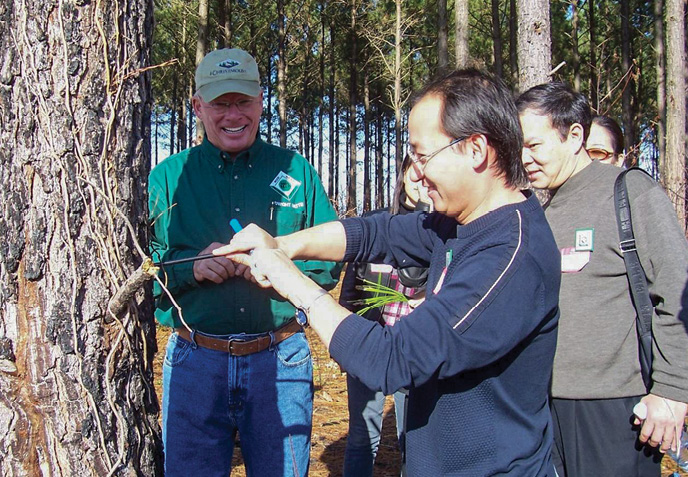
Batts Tree Farm is a century farm that has been recognized at the state and national level for its conservation practices. The farm hosts hundreds of visitors each year, including tree farmers, school groups, forestry students and even delegates from Mexico and China. Here, delegates from China use an increment borer to determine a tree’s age and growth rate.
Batts says that cost is his first consideration when purchasing equipment, followed by performance and durability. “I often go with a commercial line because it’s much more durable,” he says. “We’ve had good success when we step up to commercial grade hand tools.”
His mowing equipment includes a 6-foot Woods mower he bought new in 2002 from an area Massey Ferguson dealer; a 6-foot Frontier mower he bought this year from East Coast Equipment; and Stihl and Kawasaki brush cutters he bought from Wilson Power Mower in 2010. Wilson Power Mower is an outdoor power equipment dealership in Wilson, N.C. East Coast Equipment is a John Deere dealership with 13 locations in North Carolina.
“Mowing helps us get to the volunteer trees before they get too big. We mow fire lanes and paths at least once a year at the end of the growing and nesting season,” says Batts. Loblolly and longleaf pines are burned on a regular rotation instead of mowing to control brush and young saplings in the plantation and to improve wildlife habitat.
Yamaha 4-wheelers help make several other maintenance jobs easier. Batts owns a Yamaha Kodiak 400 and 600 that he bought from his son, David, who had managed an off-road and water sports store for a local automotive dealership. “The 400 is equipped with an electric raise and lower disc for food plot and fire lane preparation. We also have a spreader for lime, fertilizer and seed that is used for fire lane maintenance and food plot work. We have a 15 gallon sprayer on one and a 20 gallon sprayer on the other. Besides the hand wand on these two, there is a 12 foot sprayer for herbicide spraying, road maintenance, fire lane preparation and maintenance and for water when doing fire control,” he says. He bought the sprayers from Tractor Supply and Southern States Cooperative.
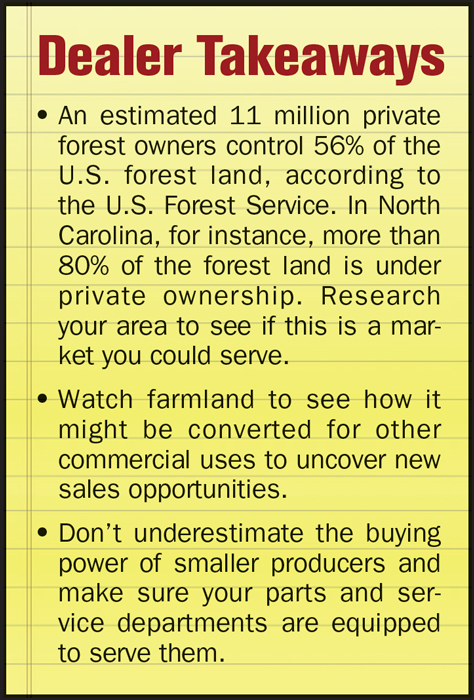 Tree trimming is a year-round task and Batts uses Stihl and Husqvarna chain saws and keeps a couple of Echo saws as a backup. Bar sizes range from 12-24 inches. “My personal favorite is an extendable 13-foot pole saw made by Stihl. It can reach 20 feet in the air and we use it to delimb the sides of trees. It can reach difficult places and it’s also safer than climbing,” he says.
Tree trimming is a year-round task and Batts uses Stihl and Husqvarna chain saws and keeps a couple of Echo saws as a backup. Bar sizes range from 12-24 inches. “My personal favorite is an extendable 13-foot pole saw made by Stihl. It can reach 20 feet in the air and we use it to delimb the sides of trees. It can reach difficult places and it’s also safer than climbing,” he says.
His most recent purchases were two Stihl MS 180 chain saws bought last fall from the Wilson Power Mower dealership. “We’re pruning 60 acres of longleaf pines and hitting every tree on all 4 sides and holding chain saws over our heads. We wanted something light,” Batts says.
He chooses his models based on customer reviews in Consumer Reports magazine and other factors. “The choice is also a consideration of availability, cost, durability and fit with other factors such as fuel mix ratios, which at one time varied between manufacturers,” he says.
Planning for Equipment
Batts says expertise and relationships are important to him when working with dealers. “I try to deal with a company that I know is going to be in business. I can’t afford to buy equipment and not have access to parts and service. And we want them to have the technology and the expertise to repair things. Sometimes, I need technical data and ask them ‘Can I modify this?’ ” he says.
“All of our Stihl equipment comes from Wilson Power Mower. They are a long-time family owned business that specializes in Stihl. They do a good job of helping maintain our equipment and can get you a part in a day,” he says.
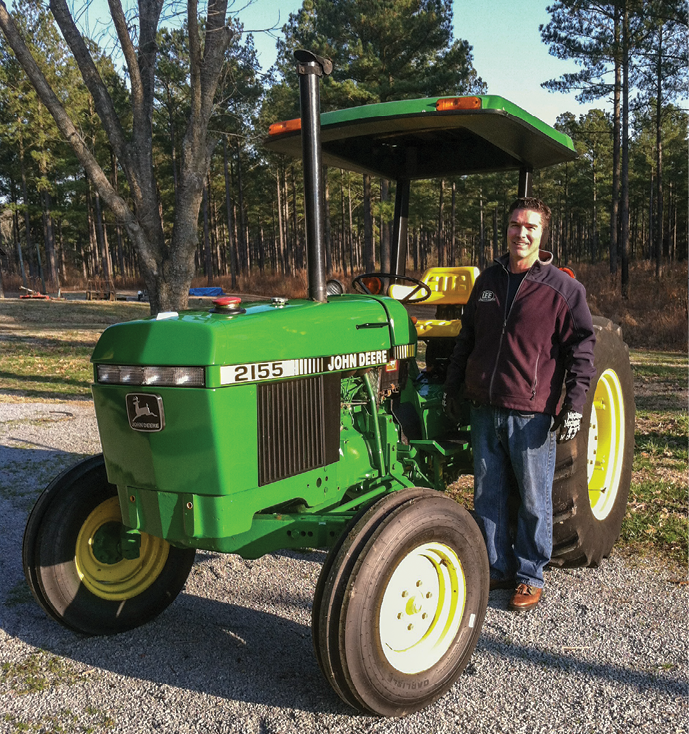
Mowing fire lanes and other areas is a major task at Batts Tree Farm. David Batts, son of tree farm owners Dwight and Judy Batts, is part of the extended family that helps maintain the tree farm. Dwight and Judy’s daughters, Lisa, Dawn and Kathy, and their families also support the operation.
Batts has a solid lineup now for his operation, but there are some other pieces of equipment that could help make things easier. “I really need a backhoe. When we have lots of rain, I have to call a friend to bring over his equipment and sometimes I can’t get on his schedule,” he says, referring to maintaining flooded areas.

Prescribed burning, mowing and spraying help control weeds and other unwanted plant growth in the forest.
“I’d also love to upgrade to a cabbed tractor and get a field cultivator with rollers, so I can replant our wildlife plots in a nice level field,” Batts says.
Promoting Stewardship
The tree farm is now mostly optimized for production, but the Batts family is constantly looking for ways to make it do more. “All the land that is going to be planted to trees
Serving Mid-Sized Producers
James Lucas, vice president of parts and service operations for East Coast Equipment, a 13-location John Deere dealership in North Carolina, has known tree farmer Dwight Batts for nearly 25 years. “Mr. Batts likes to maintain his equipment very well and he sees the value in good parts and service. He is proactive in his maintenance and that practice reduces his downtime,” he says. But, machines break down and when they do, East Coast Equipment supports Batts by having parts on hand for his older and newer equipment and providing fast turnarounds on repairs.
Lucas says his mid-sized producers, those who might farm 200-1,000 acres, demand and deserve the same attention as his large ag producers. One way they do that is through their mobile parts routes, where they stock up onsite repair parts and supplies for customers, whether they are large, mid-sized or small operators.
Another way is to offer financing to help with large repairs, even at no interest through John Deere Financial for qualified customers. “Small producers can face major tractor repairs, like $5,000 to rebuild a transmission or a $5,000-$10,000 engine overhaul or engine replacement and cashflow for that repair is a big issue,” Lucas says.
“Whether it’s serving 20 people who own 1 tractor or 1 producer who owns 20 tractors, it’s all about providing a good customer experience so they spread the word about our dealership,” he says.
has been planted. We have planted about 7 acres around the forest edges to wildflowers and grasses, so the pollinator species have longer access to pollen. They are so important for wildlife and human life and production ag,” he says. Batts and his son, David, are certified bee keepers along with having forest and prescribed fire certifications.
Some land has been recently set aside for forestry-only production. “We put 55 acres into a permanent conservation easement so that it can’t be developed. We’re trying to preserve this rural way of life and keep developments from encroaching,” Batts says. “If you are a good steward of the land, it’s going to help take care of you.”

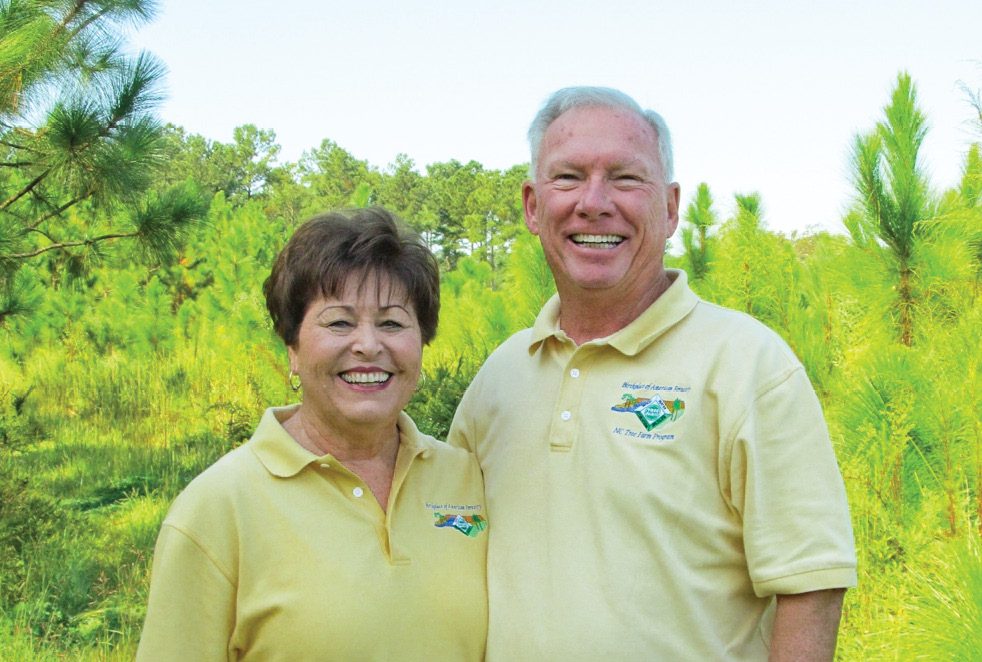




Post a comment
Report Abusive Comment